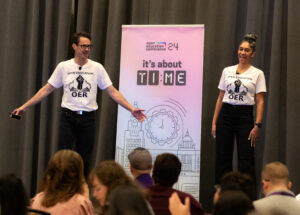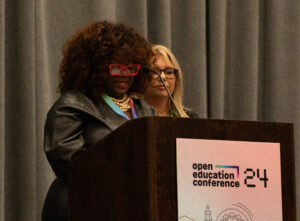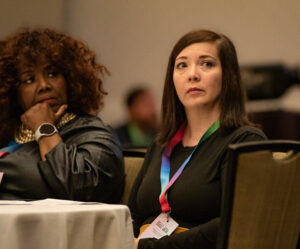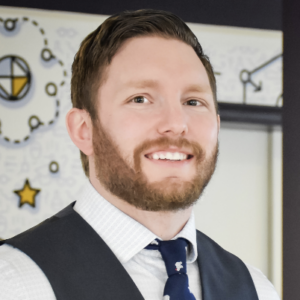Members of the open education community gathered in Providence, Rhode Island, and online October 8-10 to celebrate past progress, share current trends, and look at how to best forge ahead together in the future.
More than 400 people participated in person and another 1,200 virtually at the hybrid 2024 Open Education Conference conference (OpenEd24). The theme of “It’s About Time” reflected the importance of addressing the evolution of open education with emerging technologies and shifting landscapes. Much of the conversation centered on how to challenge conventional boundaries and promote open education that is truly open and transformative for all.
The program included more than 200 presentations, poster sessions, lightning talks, small group breakout discussions and social events for networking. Topics ranged from OER in K-12 to OER in workforce training and student-centered practices to artificial intelligence and cultivating the next generation of open education leaders.
[Recordings of sessions are available to logged-in attendees indefinitely]

James Glapa-Grossklag and Joy Shoemate deliver the keynote address.
The opening keynote address by James Glapa-Grossklag and Joy Shoemate was aimed at helping the community see itself as an active force in resisting centralizing and dehumanizing forces.
“The field strives to build a world that is equitable, inclusive, and democratic and we wanted attendees to understand that resistance is the baseline starting point for working in open education,” said Glapa-Grossklag, dean of educational technology, learning resources and distance learning at College of the Canyons in California.
Glapa-Grossklag said he was gratified by the response to the talk and was pleased with what he heard about acts of resistance to build a brighter future: “This is an incredibly vital field,” he said.
One of the most widely-attended virtual sessions was Open Education at a Crossroads, in which speakers discussed developing a plan for action and how open education is central to fighting for human rights, democracy, justice and sustainability. Another popular panel talked about offering a positive agenda for open education as big tech artificial intelligence tools expand. Seasoned OER leaders shared their experience in a program on winning strategies for building leadership support.
“There was a great breadth of content,” said Ash Barber, an academic librarian at the University of South Australia, OER collective project officer with the Council of Australian University Librarians, and member of the conference’s board of directors.
She especially appreciated the sessions with practical tips on leadership capacity, self-care for OER professionals. and valuing OER in the tenure, promotion and reappointment process. Barber said she incorporated information from a presentation on advocacy strategy framework into a workshop she led in November at the 2024 Open Education Global Conference.
“It definitely puts you in contact with people who are doing really good work and who see a different corner of the world and a different context,” said Barber, who attended the conference virtually. “Particularly where I live in Adelaide, Australia, there’s not many people who work in open education. So, for me to have somewhere to go and actually talk to people who are doing this work all the time is really important and the Open Education Conference provides that.”
Tonja Conerly, a conference board member, sociologist at San Jacinto College, and founder of the Houston Area OER Consortium, attended OpenEd24 in Providence and said she was inspired and felt the theme resonated.

Conference board members Tonja Conerly (front) and Tanya Spilovoy (rear) address attendees during the conference plenary.
“It’s time for us to re-evaluate exactly what our mission is,” Conerly said. “We have different audiences than when open ed started. It’s time for us to network and collaborate on our future.”
Conerly said she returned to her campus committed to telling other faculty members about OER and also thinking of ways to market the message to new audiences. The open education community needs to partner with librarians, instructional designers and enlist students in advocacy efforts.
“We’re innovators as OER users,” Conerly said. “We will continue to be creative and grow inside and outside our community which will allow us to expand more.”
The open education movement needs to capitalize on diverse voices to reach its full potential, said Katie Wagman, a 21-year-old senior and public policy major at UCLA. She spoke on a panel about her work as a textbook affordability fellow with Michelson Philanthropies and shared a toolkit about how to engage students.
“Students are impacted the most by OER and higher education. It makes sense to have students at the front,” said Wagman, who had attended virtually in the past, but was in-person in OpenEd24. To help students understand why they should care, messaging should be put in a broader context about how textbook costs are a piece of the puzzle in accessible education. Wagman added that students should be treated as adults and equal partners in advocacy efforts to be most effective.

Tonja Conerly (left) and Rachel Meisner (right), members of the Open Education Conference Board of Directors.
The opening keynote presentation resonated with attendees and there were immediate discussions about collaborating on projects with student advocacy organizations, said Rachel Meisner, a member of the OpenEd board of directors and learning resources coordinator with the Colorado Community College System. Getting students involved in promoting OER and pushing back against automatic textbook billing programs is key to sustainability of the movement, she said.
In Colorado, Meisner is developing student OER clubs or ambassador programs at the state’s 13 community colleges. They will teach students about advocacy principles and practices for OER, such as writing carefully crafted letters to administrators and legislators to support OER. Meisner, who attended a SPARC advocacy training earlier this year, said student voices are more likely to be heard and their messages of equity and representation in OER can have traction.

Brandon Carson, lecturer, researcher and doctoral student at Ontario Tech University in Ontario, Canada.
Brandon Carson said he came away from OpenEd24 with practical frameworks and tools that will be useful to advance open educational practices as a lecturer, researcher and doctoral student at Ontario Tech University in Ontario, Canada. He has attended the conference online for four years and served on the board of directors since 2022.
“The opportunity to virtually connect with fellow researchers and practitioners was enriching,” Carson said. “Engaging in discussions with experts in the field not only broadened my understanding of open education but also sparked ideas for potential collaborations…Overall, the event provided both the tools and the inspiration to enhance my research and foster meaningful partnerships in the open education community.”
Save the date! OpenEd25 will be October 28-30, 2025, in Denver and online, Sign up for updates.